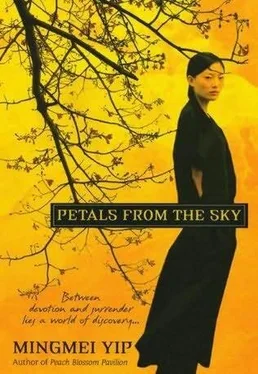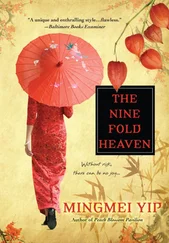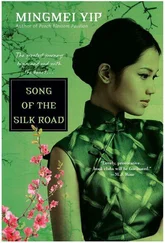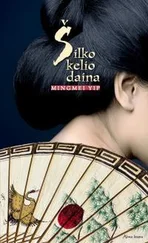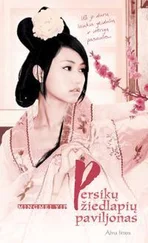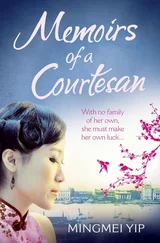“I am terribly sorry. What happened?”
“Lung cancer. He smokes too much.”
“Oh, I am so sorry.”
“You don’t have to be sorry; it’s his karma,” she said flatly. Then, to my slight disgust and fascination, she squatted down once again to prepare tea.
The “kitchen” was a small area with several bricks on top of which rested a few cooking utensils, bottles of sauces and condiments, and two gas burners. The soup now emitted an aroma of mixed vegetables and herbs. The water for tea began to boil, uttering a deep guttural sound, like a wise old man trying to give advice. I started to feel more relaxed.
After a while, Dai Nam went to the wooden table, cleared space among the manuscripts, and motioned me to sit down opposite her. She began to arrange a ceramic tea canister, a teapot, and four tea bowls on a lacquer tray. To my surprise, the bowls were as tiny as soy-sauce dishes. Was she not thirsty, or was her tea that precious? She lifted the kettle and began to pour hot water over the outside of the pot and the bowls.
I asked, “Dai Nam, shouldn’t you pour water inside the pot?”
“I’m performing tea ceremony for you.” She looked at me chidingly. “It takes time. This is only the first step, called warming the utensils.”
Feeling embarrassed, I remained silent while intently watching her next move. With her strong, thick fingers, she took tea leaves from the canister and dropped them into the pot, then added water until it rose to the top. “Now let the tea enjoy a quick spa,” she said, closing the lid. Then she repeatedly poured hot water over the pot and bowls. “This is to warm the pot and bowls. Otherwise the taste will be spoiled.”
Moments later, she lifted the lid and told me to appreciate the leaves. “Before we taste it with our mouths, we should first savor it with our eyes. Now look at how the leaves blossom into different shapes when they unfold in the water.”
After we’d taken a quiet moment to appreciate the leaves, she poured tea into the four bowls. “I laid them in a straight line so that when I pour water into the bowls, the tea’s strength will be the same. “She handed me a cup. “Now appreciate the color.”
“Beautiful,” I said. “Looks like champagne.”
“No, it doesn’t.” Dai Nam cast me another chiding glance. “Ancient connoisseurs said that wine emboldens heroes’ guts while tea inspires scholars’ thoughts. So the two are completely different.”
I nodded; she continued, adopting the tone a teacher uses when directing her student. “Now smell.” She brought the cup to her nose, deeply inhaling. Immediately I did the same.
“Good!” She lowered her cup, her eyes closed.
Indeed, the fragrance seemed pure to the point of intoxication.
With her thumb and index fingers holding the upper rim of the cup and her middle finger its bottom, Dai Nam lifted the cup to her mouth and took a sip. I did the same, but burned my tongue; I let out a small cry.
She squinted at me. “Meng Ning, you don’t drink good tea in one big gulp-that’s considered to be very crude, not to mention that you’ve wasted it.”
My ears felt hot. “Then what am I supposed to do?”
“You hold the tea in your mouth for a few seconds to savor its sweet, pure taste before you swallow it.” She demonstrated with another cup and I followed suit.
“Now do you feel a cool breeze in your armpits?”
Of course she didn’t mean it literally, but symbolically-that I should feel as light as a spirit.
“Thanks, it’s great tea.”
She contradicted me again. “It’s good, but not great. It’s not just the leaves that matter. In Paris, it’s impossible to get good water to brew tea. I only use bottled spring water.”
“That’s not good enough?”
“Of course not. The best is water from a mountain, second is water from a river, third is water from a well.” She paused, then spoke again meditatively. “Melted snow gathered from petals of plum blossoms and stored over years in tightly sealed ceramic jars is also supposed to be very good.”
She must have read about the nun Wonderful Jade in Dream of the Red Chamber. Like the nun who’d brewed tea from snow, had Dai Nam also been longing for a man? I was wondering, but I said instead, “I never knew there was so much scholarship behind tea drinking.”
“There’s always more to things than what meets the eye.”
Meaning what-that there was a poignant love story behind that scar of hers?
She was now busy preparing another round. I asked, “Why is the cup so small that we have to drink so many to quench our thirst?”
“Meng Ning, you’ve completely missed the point.”
“What is it?”
“The point is not to quench thirst, but to quench one’s restlessness and arrogance. Preparing and tasting tea is a process of self-pursuit and cultivation.”
As I listened to Dai Nam’s rough voice speak of the philosophy of tea and watched her calloused fingers deftly maneuvering the tea utensils, I was intrigued by this newly revealed side of her character. I wondered what other sentiments lay concealed under her emotionless face.
She went on. “I learned tea ceremony from a nun I met in the Buddhist college I attended in Hong Kong. I have to drink a lot of tea to keep me from falling asleep when I meditate.” She broke off, then began again. “Also, the ritual of preparing tea pacifies me. The ancients said that tea drinking could dissolve loneliness, dissipate troubles through one’s pores, purify one’s heart, and lead one to enlightenment.”
I nodded in agreement while she slowly wiped the pot with a clean towel. “This is to nurture the heart as well as the pot.”
Watching Dai Nam’s practiced fingers, I suddenly realized that the warmth and fragrance of tea and the order of tea ceremony must be a source of sanity in her life, and the stylized ritual a means to channel her trapped emotions.
Dai Nam picked up a handful of leaves and put them under my nose. “Smell-this is the best oolong tea.”
I inhaled deeply. “Very good indeed. Where did you get it?”
I wondered how, as a student, she could afford these luxuries for the tea ceremony.
She said, “It was a gift. Almost all my possessions are gifts. My school fees and living expenses here are all sponsored by a nunnery in Hong Kong.”
“You’re so lucky, Dai Nam.”
“Hmm…yes and no.” She pondered. “People back home are nice to me, but my professors here are not giving me enough help with my research. I have a feeling that since I am Chinese and my French is no good, they just don’t want to bother.” Dai Nam went on to complain about how all the courses on Buddhism in the Université de Paris VII were too elementary for her and a waste of her time, how people snubbed her in the Cité Universitaire dormitory so she’d had to move here, how the library of L’Institut des Hautes Études Chinoises didn’t have the books she needed for her dissertation…
She had finished preparing the second round of tea and handed me another cup. This time I had learned my lesson and sipped the tea carefully.
Her raw, intense voice filled up the room. “I’ve always liked tea as my father liked cigarettes,” she said. “But I’m disgusted by his smoking, the rotten addiction and attachment behind it.” Finally she took a long, noisy sip, then added matter-of-factly, “Anyway, I don’t like my father, smoking or not.”
This open criticism of her father shocked me; I put down my tea. “What makes you dislike your father?”
Taking another noisy sip, Dai Nam said, her eyes half closed and her voice distant, “Because he never liked me. I’m a girl, his first born.” She broke off, put down her cup with a hard thud, then went on as if talking from a dream. “In Canton where we lived, my father worked as a waiter. Every night after the restaurant was closed and the owner had finished calculating the bill and paid everyone, my father would dash off to a prostitution house owned by a middle-aged widow. My father went crazy over her and spent almost everything he earned buying her clothes, jewelry, perfume, and food, and then gambled what was left in her prostitution house.
Читать дальше
